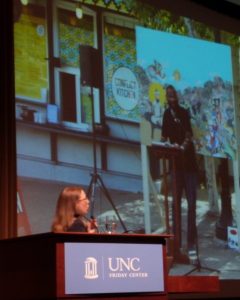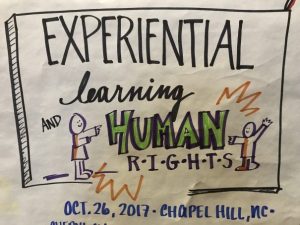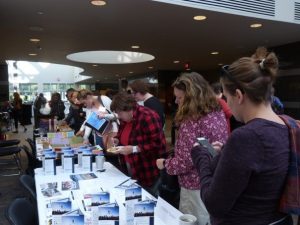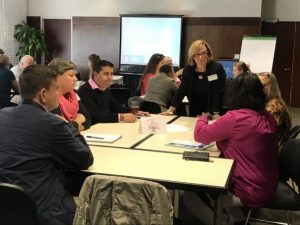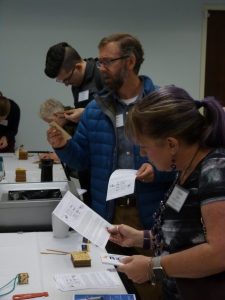Daniel McNeal | November 7, 2017
Over 200 educators from across North Carolina descended on Chapel Hill last week to participate in World View’s K-12 Global Education Symposium on Human Rights and Social Justice. Working off of a theme developed three years ago, World View welcomed experts from across the country to discuss issues and to learn about available resources related to human rights and social justice.
Robin Kirk, the Co-Director of the Duke Human Rights Center at the Franklin Humanities Institute opened the symposium by providing a framework to understand what human rights are and why it’s necessary to have social justice. The talk provided the lens for participants to look through as the rest of the symposium unfolded. Following Dr. Kirk, faculty members from UNC-Chapel Hill’s School of Education and several practicing teachers provided testimonials and shared examples of projects that exemplified experiential learning and human rights in classrooms.
World View was excited to welcome Dawn Weleski, an artist and co-founder of Conflict Kitchen, a former restaurant that only serves cuisine from countries with which the U.S. government is in conflict. Dawn spoke to the audience about how Conflict Kitchen uses the social relations of food and economic exchange to engage the general public in discussions about countries, cultures and people that they might know little about. During lunch, Conflict Kitchen materials were placed on each table setting and educators were encouraged to try new foods, meet new friends and continue the conversations started in the keynote talk by Dawn Weleski of Conflict Kitchen.
Small group sessions offered a deeper exploration into specific huma n rights issues, strategies for integrating human rights into instruction and additional resources for educators. During the symposium Wendi Pillars, a graphic facilitator and author illustrated the presentations. This graphic representation of what was being discussed was then displayed throughout the conference’s main room for participants to see more closely.
Throughout the symposium participants had an opportunity to meet with exhibitors and to work on “Passport to Knowledge” activities that engaged educators in thoughtful discussion and created a hands-on learning experience. Activities included virtual reality goggles that allowed you to take a virtual tour of a refugee camp, a MakerSpace where participants could create a barrier locket to symbolize human rights, as well as kiosks that posed questions like “Who is your human rights hero”?
The second day of the symposium started with a plenary talk by Dr. John Cox, a professor and the Director of the Center for Holocaust, Genocide and Human Rights Studies at UNC-Charlotte discussing the impact of human rights challenges faced around the world. Fareed Mostoufi, the Senior Education Manager at the Pulitzer Center for Crisis Reporting followed Dr. Cox and shared the multitude of resources and ways that educators can connect with the Pulitzer Center. One way to connect was demonstrated when Fareed had a video chat with Daniella Zalcman, a journalist and grantee of the Pulitzer Center on Crisis Reporting.
After small group reflection and action planning sessions, the symposium ended with two important talks. The first by Dr. Thomas RaShad Easley, a hip hop forester and the diversity director of the College of Natural Resources at NC State University, helped educators understand the importance of sharing their personal narratives as a bridge to working with students and introducing critical social justice issues.
The second talk, given by Dr. Omid Safi from Duke University, challenged us as educators to not sit idly by as human rights are challenged and violated.
It was an eventful day-and-a-half program. Educators left enriched with knowledge and numerous resources that they can incorporate into their classrooms.
World View’s next program will be the Community College Symposium, Innovation and Technology, on November 15 and 16. For K-12 audiences, World View will hold two seminars in March. More information can be found here.

